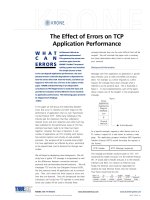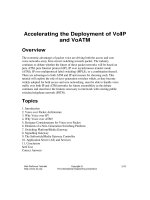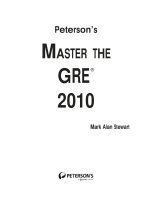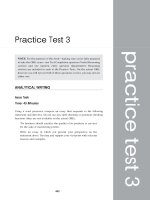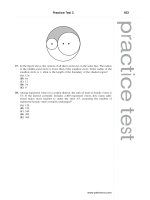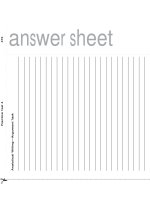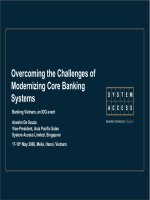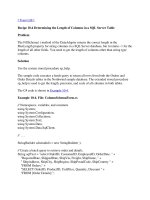Tài liệu Lincoln: The Biography of a Writer docx
Bạn đang xem bản rút gọn của tài liệu. Xem và tải ngay bản đầy đủ của tài liệu tại đây (1.97 MB, 417 trang )
Lincoln
Th e B i o g r a p h y
o f a W r i ter
Fred Kaplan
To the memory of my father, Isaac Kaplan (1906 1987); and
to Hattie M. Strelitz, the teacher who, on the Lower East Side
of New York City in December 1918, awarded him a copy of
The Perfect Tribute, an idealistic myth about the writing of the
Gettysburg Address. It was given to him for “Proficiency and
Excellent Class Spirit” and came into my hands a generation
later. It impressed me deeply with a truth that empowers us
all: the power of Lincoln’s language.
Contents
Reading Lincoln’s Words 1
CH A P T E R 1
“All the Books He Could Lay His Hands On,” 1809–1825 3
CH A P T E R 2
Shakespeare, 1825–1834 30
CH A P T E R 3
Burns, Byron, and Love Letters, 1834–1837 60
CH A P T E R 4
“How Miserably Things Seem to Be Arranged,” 1837–1842 99
CH A P T E R 5
“Were I President,” 1842–1849 144
CH A P T E R 6
“Honest Seeking,” 1849–1854 198
CH A P T E R 7
“The Current of Events,” 1855–1861 242
[ v ]
Contents
i
CHAPTER 8
The Master of Language and the Presidency, 1861–1865 294
Annotated Bibliography 357
Notes 363
Acknowledgments 385
Index 387
About the Author
Other Books by Fred Kaplan
Credits
Cover
Copyright
About the Publisher
Reading Lincoln’s Words
For Lincoln, words mattered immensely. His increasing skill in their use
during his lifetime, and his high valuation of their power, mark him as the
one president who was both a national leader and a genius with language
at a time when its power and integrity mattered more than it does today.
His was a personality and a career forged in the crucible of language.
The novelist William Dean Howells’s claim about his friend Mark Twain,
that he was the “Lincoln of our literature,” can effectively be rephrased
with the focus on our sixteenth president: Lincoln was the Twain of our
politics. Since Lincoln, no president has written his own words and ad-
dressed his contemporary audience or posterity with equal and enduring
ef
fectiveness.
Lincoln was born into a national culture in which language was the
m
ost widely available key to individual growth and achievement. It dom-
inated public discourse. No TVs, DVDs, computers, movie screens,
rad
ios, or electricity, and no sound-bites. Language mattered because
it was useful for practical communication and for learning and because
it could shape and direct people’s feelings and thoughts in a culture in
which spoken or written words had no rival. In Lincoln’s case it also mat-
tered immensely because it was the tool by which he explored and de-
fined himself. The tool, the toolmaker, and the tool user became insepa-
rably one. He became what his language made him. From an early age, he
[ 2 ]
Fred Kaplan
began his journey into self-willed literacy, then into skill, and eventually
into genius as an artist with words.
Lincoln is distinguished from every other president, with the excep-
tion of Jefferson, in that we can be certain that he wrote every word to
wh
ich his name is attached. Though some presidents after him wrote
well, particularly Grant, Wilson, and Theodore Roosevelt, the articula-
tion of a modern president’s vision and policies has fallen to speechwrit-
ers and speech-writing committees, with the president serving, at best,
a
s editor in chief.
Lincoln was also the last president whose character and standards
i
n the use of language avoided the distortions and other dishonest uses
of language that have done so much to undermine the credibility of na-
tional leaders. The ability and commitment to use language honestly and
co
nsistently have largely disappeared from our political discourse. Some
presidents have been more talented in its use than others. Some, such
as Franklin Roosevelt and John F. Kennedy, have had superior speech-
writers. But the challenge of a president himself struggling to find the
co
njunction between the right words and honest expression, a use of
language that respects intellect, truth, and sincerity, has largely been
abandoned.
CHAPTER 1
“All the Books He Could Lay
His Hands On”
1809–1825
At six years of age, for a few weeks in the fall of 1815, in the town of
Knob Creek, Hardin County, Kentucky, the boy went to his first school,
taught by a typical frontier teacher commissioned by local parents to pro-
vide children with basic skills and only sufficiently knowledgeable him-
self to rise modestly above that level. Teachers were in short supply on
the frontier that ran along the western ridge of the Appalachians; beyond
was the sparsely settled western portion of Ohio and the territories of
Indiana and Illinois; southward, much of the states of Kentucky and Ten-
nessee. Cash also was in short supply. Material possessions were mini-
mal. By modern standards it was a starkly rudimentary life.
In this community of Protestants the supremacy of the Bible as the
book of daily life encouraged acquiring basic reading skills. Simple arith-
metic came next. “His father,” the grown-up boy later recalled, “sent him
to this school with the avowed determination of giving him a thorough
education. And what do you think my father’s idea of a thorough educa-
tion was? It was to have me cipher through the rule of three.” Beyond
that, education was a luxury that neither time nor money permitted. In-
tellectual curiosity in a society in which it had no likely practical reward
was rare, except for the occasional child who, inexplicably, without any
[ 4 ]
Fred Kaplan
relation to who his parents were and what the community valued, was
transfixed by the power of words.
Words and ideas were inseparable in a nation in which the Bible dom-
inated. It was given full currency as the source of the dominant belief
syste
m. It was also the great book of illustrative stories, illuminating ref-
erences, and pithy maxims for everyday conduct. More than any other
g
lue, it held the society together, regardless of differences of interpreta-
tion among Presbyterians, Baptists, and Methodists. This was a world
o
f believers. Here and there was a deist, an agnostic, or an atheist, but
even those who had grounds of disagreement with Christian theological
claims generally did so within the tribal circle and expressed themselves
in small deviances, such as not attending church regularly or at all. De-
istic voices from afar, from the East Coast, from the Founding Fathers,
e
ven from Europe, occasionally could be heard in the Appalachian woods
and beyond. The deists rationalized religion, eliminated mystery: there is
a creator, a God; otherwise, human beings are on their own, dependent
on reason and action. But rural American Protestants in the nineteenth
century much preferred miracle, redemption, brimstone, the literal
truth of the Bible, and the apocalypse to come. As six-year-old Abraham
Lincoln began to learn to read, his household text was the Bible.
His parents were fundamentalist believers, regular worshippers.
W
ithout education and illiterate, Thomas Lincoln was also blind in one
eye and had weak sight in the other, which may have perpetuated his il-
literacy. To sign his name, he made his mark. To worship, he recited and
sa
ng memorized prayers and hymns. Since words and beliefs were insep-
arable, he depended on cues from others and especially on his memory,
wh
ich was the agent of sacred prayer and biblical knowledge. Both liter-
ate and illiterate American Christians often memorized long stretches of
t
he Bible. And as young boys like Abraham became literate, they devel-
oped their ability to remember. From an early age, Lincoln had a tena-
cious memory. By modern standards, few books were available to him.
T
hose he could recite almost by heart.
His first teacher was his mother, who had learned to read but not
Lincoln
[ 5 ]
write. Thin, slight, dark-haired, Nancy Hanks was born in 1783 in Vir-
ginia, the daughter of Lucy Hanks and an unidentified father. In 1806,
she married Thomas Lincoln. The next year, in Hardin County, Ken-
tucky, where they had settled, she had her first child, Sarah; on Febru-
ary 9, 1809, Abraham; then another son, who died in infancy. Unlike
h
er prolific Hanks predecessors and contemporaries, she was to have no
more children.
What young Abraham learned from his father had nothing to do with
boo
ks. In his later testimony to the absence of family distinction, he gave
short shrift to his father’s contribution to his upbringing. His stocky,
muscular, dark-haired, large-nosed father, about six feet and almost two
hundred pounds, seemed a Caliban of the carpentry shop and the fields.
Thomas Lincoln’s illiteracy, though, was less remarkable to his son than
what the boy took to be his father’s disinterest in learning to read and his
lack of ambition in general. It left him a marginal man who at an early
age had fallen out of the mainstream of American upward mobility, a
plodder without ambition to rise in the world. But he had not been born
to that necessity. The father that the young adult Lincoln knew had been
substantially formed by circumstances, though for the son the totality
was subsumed into a sense of his father’s character. It was not a char-
acter that he admired. And it was one that he needed later to distance
h
imself from. Thomas Lincoln “was not a lazy man,” a contemporary of
Abraham’s remembered, but “a piddler—always doing but doing nothing
great—was happy—lived Easy—and contented. Had but few wants and
Supplied these.”
Both father and son knew less than modern scholars about the paternal
f
amily’s history, mostly because Thomas Lincoln had been cut off from
much of his past. He knew only that his great-grandfather came from
Berks County, Pennsylvania, to Rockingham County, Virginia, where
his grandfather, the Abraham he named his son after, had four broth-
ers. Everything before was lost in the haze of illiteracy and family trag-
edy. Actually, the first American Lincoln, Samuel, had emigrated from
E
ngland to Massachusetts in the seventeenth century. A next generation
[ 6 ]
Fred Kaplan
had been Quakers in Pennsylvania, where Samuel’s grandson, Morde-
cai, had prospered. Mordecai’s son, John, became a well-to-do farmer
in Virginia. And it was one of John’s sons, Abraham, who moved in the
1780s from Virginia to Kentucky with his five children, three of whom
were sons, Mordecai, Joseph, and Thomas. In 1786, while planting a
cornfield, Abraham was killed by Indians. As his body lay in the field,
ten-year-old Thomas sat beside it. An Indian ran out of the woods toward
him. Fifteen-year-old Mordecai, concealed in the cabin, aimed and shot
the Indian in the chest. It was the eponymous story of Thomas’s life,
retold many times by a man who had a gift for narrative, got along with
his neighbors, and attended church regularly.
Primogeniture gave his eldest brother the family possessions. The
o
ther sons were expected to move on. Thomas was not sent to school,
even to learn arithmetic. A manual laborer as a teenager, then a carpen-
ter, and then a farmer, he managed sustenance and little more. He made
r
ough tables and cabinets on commission, built barns and cabins, made
coffins. When he eventually acquired property, it provided mostly back-
breaking work and disappointment. He had bursts of pioneer energy, re-
settling twice. Decent in every way, he struggled through life, gave no
o
ne any trouble, and made do. He started more strongly than he finished
and, as he grew older, did only the irreducibly necessary.
In spring 1806 he had a glimpse beyond Kentucky. Hired to build a
fl
atboat for a local merchant, he took it, loaded with goods, to New Or-
leans via the Ohio and Mississippi rivers. As a carpenter and day laborer,
h
e accumulated enough cash to buy, soon after his son was born, almost
350 acres in Hardin County. He still owned some of the 200 he had pur-
chased in 1803, on Nolin River, near Hodgenville, called Sinking Spring
Fa
rm. Then, in 1811, he bought 230 acres on Knob Creek, northeast of
Hodgenville, to which he moved his family. On each farm, he built a one-
room log cabin. So, too, did everyone else of his station and means, and
the small commercial buildings of the local townships were identical, at
most slightly larger. Thomas Lincoln’s land transactions, including prom-
issory notes and delayed sales, had title and debt complications. In the
Lincoln
[ 7 ]
end, their actual value amounted to the equivalent of three or so years
of what he could save from his earnings. It was not inestimable, given his
start, but it left a narrow margin and next to no cash.
Thomas mainly seems to have taught his son by negative example.
T
o Abraham, manual labor, especially farming, was the enemy of self-
improvement. It needed to be transcended by the accumulation of capi-
tal, profit of some sort. The capital that, from the start, overwhelmingly
a
ttracted Abraham was the capital of the mind, though in his adult life
he also revealed an affinity for literal capital, interest-bearing loans that
made his money work while, as a lawyer, he used his mind to work for
money. Poring over his first lessons, he could have had little awareness of
why he was reading. Pleasure in language and pride in literacy probably
compelled his engagement. But later, when he read for opportunity, he
certainly had a purpose. Among other things, he did not want to suffer
the economic fate of his father. And in his adult life he found little room
for his father’s presence.
At first, manual labor seemed likely to be his lifelong fate, though
co
mpetition between the attractions of intellect and the demands of phys-
ical labor began at an early age. His mother’s lessons and his own efforts
to m
erge memory and literacy as he attempted to read the Bible were
assisted by lessons in spelling and arithmetic at his first school. In 1816,
Caleb Hazel, a family friend living next to the Lincoln farm, became
Abraham’s second schoolmaster. Lincoln’s first formal lessons in literacy
came from Thomas Dilworth’s New Guide to the English Tongue, popularly
known as Dilworth’s Speller, a widely reprinted textbook first published
in London in 1740. The boy may have seen from the title page that his
copy had been published in Philadelphia in 1747, but he would not have
known that the printer was Benjamin Franklin, who had also “made the
woodprints” illustrating the selections from Aesop’s fables. Whatever the
edition he had in hand, it apparently became a family possession, provid-
ing him with his introduction, other than the Bible, to the power of the
w
ritten word.
If he puzzled, as is likely, over Dilworth’s lessons in spelling and
[ 8 ]
Fred Kaplan
grammar, he quickly mastered the former, his sharp ear picking up the
phonetic basis of English spelling and its variants, his voice soon capable
of imitation and mimicry, his acumen sufficient to make him an excel-
lent speller. A few years later, in 1818, when he attended his third school,
“w
e had Spelling Matches frequently,” a schoolmate recalled, “Abe always
ahead of all the classes he Ever was in.” Grammar came more slowly,
probably because of the gap between Dilworth’s rules and the colloquial
grammar of everyone around Abraham. The textbook’s examples of cor-
rect grammar would have seemed like the speech of aliens from another
w
orld. Like every British and American textbook in the eighteenth and
nineteenth centuries, this New Guide to the English Tongue also taught Prot-
estant theology and moral behavior, its substance inseparable from its
pedag
ogy. The purpose of literacy was to advance the teaching of reli-
gious, moral, and civic values. For innumerable Dilworths, the only lit-
erature of value was wisdom literature: the synthesis of language, imagi-
nation, and literary devices that taught one how to live as a good and
t
heologically correct Christian. The mission of such books was to in-
troduce children, step by step, level by level, to Christian moral perfec-
tion.
With his parents, Abraham attended the Little Mount Separate Bap-
tist Church, near Knob Creek. Each Separatist Baptist congregation de-
termined church policy by democratic vote. Preachers preached. Calvin-
ist dogma was asserted. The cast of mood and expectation about this life
a
nd the next were formed. Life was depicted as a battleground between
good and evil impulses, and human destiny was in God’s hands. Indeed,
since Adam’s fall had sealed human fate in this world forever, earth was
a vale of tears where men had to earn their bread by the sweat of their
brows and women bring forth children in pain. There was also the ex-
pectation of rebirth for the saved and a strong sense of communal soli-
darity, the conviction that believers shared a moral foundation, a spiri-
tual communion, and a social connectedness that made them an engaged
co
mmunity. One was never alone if one had a church. Lincoln’s parents
and their church believed that only adults should be baptized into mem-
Lincoln
[ 9 ]
bership in the congregation. The boy would come to that when he was of
an age to feel God’s presence and make an informed decision.
In the meantime, Di
lworth’s Speller was a help and a challenge, a for-
mative book whose message, like his parents’ religion, influenced him
selectively. Some of the language and its lessons entered deeply into him.
They became touchstones of his temperament and memory, not because
they formed him but because they were there as guideposts in his forma-
tive years. Dilworth gave him permission to be different from his father
a
nd to transcend the limits of his frontier community. “It is a commend-
able thing,” he read, “for a boy to apply his mind to the study of letters;
t
hey will be always useful to him; they will procure him the favor and
love of good men, which those that are wise value more than riches and
pleasure.” Dilworth gave the highest value to reading as a repository of
social and emotional utility, words of wisdom and words for advance-
ment. Even if the pen was not mightier than the axe, at least it was a de-
sirable alternative. There were trees to be cut, lumber to be stacked, fire-
wood to be split, fields to be cleared. In a world in which physical labor
p
redominated, a boy’s strength was measured and noticed from the start.
Strong and tall for his age, he was required to do his share. His parents
and community assumed that this would be his lifelong work. Dilworth
helped him to see himself differently.
If to modern ears, jaded with centuries of self-help maxims, Dil-
w
orth’s words seem unexceptional, they spoke resonantly to many nine-
teenth-century Americans, reinforcing the values of their Christian
homes and of Protestant due diligence. Since children needed to have no
doubt about man’s position on earth, Dilworth taught that “by the Fall
of Adam from that glorious and happy state, wherein he was created, the
Divine image in [man’s] Mind is quite changed and altered, and he, who
was created but a little inferior to the Angels above, is now made but
little superior to the Angels below.” The phrase stayed strongly enough
in Lincoln’s consciousness to emerge eventually as an expression of post-
Calvinist appeal to “the better angels of our nature.”
It was also a short distance from Dilworth’s expression of the common
[ 10 ]
Fred Kaplan
wisdom about obedience to Lincoln’s adult view. “Obedience compre-
hendith the whole duty of man,” he read in Dilworth’s New Guide to the
English Tongue, “both towards God, his neighbor, and himself; we should
therefore let it be engraven on our hearts, that we may be useful in the
common-wealth, and loyal to our magistrates.” Lincoln was continually
to give highest priority to his duty to the law, as embodied in the Con-
stitution, and to the preservation of the commonwealth. Obedience to
t
he magistrates became the guiding pole of his public life. More or less,
he walked in the paths of such communal piety always, except in regard
to Christian theology, though even there Dilworth’s language remained
part of him. During the last half-dozen years of his life, when the pres-
sures of war and his obligation to rally the nation in terms that it under-
stood pushed hard, he drew heavily upon the Judeo-Christian language
t
hat had dominated his childhood.
As the repository of the values of a widely shared common culture,
D
ilworth played both a germinating and a reinforcing role. Lincoln’s pri-
vate life and his public image merged as an exemplification of the maxim
t
hat “Personal merit is all a man can call his own. Whoever strictly ad-
heres to honesty and truth, and leads a regular and virtuous life, is more
t
ruly noble than a debauched abandoned profligate, were he descended
from the most illustrious family.” “Honest Abe” emerged as a fulfillment
of this widely held ideal. Better an honest than a clever politician. And
Lincoln’s life soon became an embodiment of an economic ideal that Dil-
worth neatly expressed: “Trade is so noble a master that it is willing to
en
tertain all mankind in its service; and has such a variety of employ-
ments adapted to every capacity, that all, but the lazy, may support at
l
east, if not enrich themselves.” In search of vocation, Lincoln sampled a
variety of employments. In the main, he became a lawyer-businessman,
a frugal lender rather than a borrower, who believed that free labor was
man’s supreme self-definition and that all capital resulted from the sweat
of the physical and mental brow. Dilworth urged boys to take the busy
ants as their model, “For in their mouths we see them carry home / A
stock for winter, which they know must come.”
Lincoln
[ 11 ]
He also provided the boy with his introduction to written stories
other than those in the Bible. The twelve stories in the Guide came from
Aesop’s fables, each exemplifying the advice and guidance of the previous
lessons in reading and values. He quietly absorbed the wisdom of fables
that concluded that “He that will not help himself, shall have help from
nobody,” “Make no friendship with an ill-natured man,” “Honesty is the
best policy,” “Let envy alone and it will punish itself,” “One good turn
deserves another,” “Evil be to them that evil think,” and “A bird in hand
is worth two in the bush.” Such commonplaces seemed profound wisdom
simply expressed. Aesop became an enduring favorite. As soon as Abra-
ham himself began telling stories, these fables, and then the fable-like
sto
ries he invented to amuse and persuade others, became self-defining.
He also read, probably aloud, the small number of poems in Dil-
worth, sounding out the verses as a strange but beautiful use of language.
T
hough the Calvinistic frame of mind judged much poetry frivolous, the
poetry the boy encountered now was as pedagogic as Dilworth’s prose
maxims. It too focused on developing Christian character, and it seems
likely that Dilworth either created or borrowed many of the selections
from unidentified sources. One dealt with “Ambition,” a topic that soon
preoccupied Lincoln, on which he was to quote other, more famous au-
thors later in his life, and to write and speak about publicly. The note of
t
he adult Lincoln’s concern is struck:
Dazzled with hope, we cannot see the cheat
Of aiming with impatience to be great.
When wild ambition in the heart we find,
Farwell content, and quiet of the mind:
For glittering clouds, we leave the solid shore,
And wanted happiness returns no more.
Another poem, “Heavenly Love,” emphasizing forgiveness and recon-
ciliation, summarized a less deterministic view of the drama of Christian
sa
lvation than that of his parents’ church:
[ 12 ]
Fred Kaplan
Christ’s arms do still stand open to receive
All weary prodigals, that sin do leave;
For them he left his father’s blessed abode;
Made son of man, to make man son of God:
To cure their wounds, he life’s elixir bled,
And dy’d a death to raise them from the dead.
While none of the Jesus-centered theology of his childhood world re-
mained central to his adult life, the power of poetic language, some of it
sec
ular, some religious, stayed with him.
Soon he was writing his own verses. His temperament responded to
t
he emotional force of poetry. Meter and rhyme appealed to him. At first
he wrote brief squibs, not all of his own creation. Later he tried his hand
regularly as a poet, especially in times of sadness. Indeed, one of Dil-
worth’s poems was his first introduction to a poetic subject and tone that
suited his developing personality. It became the hallmark of his tempera-
ment. Later he would memorize poems of loss and bereavement, such as
T
homas Gray’s “Elegy Written in a Country Church-Yard” and Oliver
Wendell Holmes’s “The Last Leaf,” the heightened sense of the transience
of all things attracting him deeply and helping him cope with loss. Ele-
giac stoicism became the weight that he carried; it sculpted the stoop of
h
is shoulders and it darkened the cast of his face. His eyes, later observers
remarked, were filled with sadness even early in his life. Though events
eventually made the emphasis permanent, Dilworth’s “Life Is Short and
Miserable” gave him one of his first poetic gateways into melancholic self-
discovery:
Ah! Few and full of sorrow are the days
Of miserable man: his life decays
Like that frail flower, which with the sun’s uprise
Her bud unfolds, and in the evening dies:
He like an empty shadow glides away
And all his life is but a winter’s day.
Lincoln
[ 13 ]
***
Knob Creek provided his earliest impressions of daily life, his first
memories of any specific place. Nothing distinguished the farm, with
its hogs and four horses, from many other low-yield properties. Some of
the land was still being cleared; all of it needed constant maintenance.
It was rocky, difficult to work, and barely profitable. There were the
usual animal and agricultural smells, the daily labor, the seasonal con-
ditions—mild autumns, early springs, humid summers, winter cold, a
single fireplace for heating and cooking. Hunting provided meat, with
butchering and death a household commonplace. Huge flocks of birds,
especially pigeons, filled the sky in Audubon’s avian paradise. Boys
chased and shot them for sport and food. Water had to be carried from
a distance. Sarah and Abraham were kept busy with suitable chores.
It was, though, far from an isolated existence. There were neighbors.
Hodgenville, where they bought supplies, was ten miles distant. The
well-traveled Cumberland Road between Louisville and Nashville ran
directly by the property. Travelers going southwest and returning were
in sight and hearing.
News of national events came by voice to people who did not subscribe
to n
ewspapers, even if they could read. Travelers brought news that Con-
gress had declared war against Great Britain in 1812, that the war was
g
oing badly between 1812 and 1814, and that the nation had good reason
to crow in January 1815 when Andrew Jackson’s army defeated the Brit-
ish at New Orleans. Some soldiers, returning home, “came by Lincolns
h
ouse,” a contemporary remembered, “and he fed and Cared for them.”
Word of the victory may have gotten to Hardin County before it got
to Washington, probably arriving in time for Abraham’s sixth birthday.
That America had gained nothing tangible by the war, not even a formal
end to Britain’s impressing American sailors, hardly mattered to West-
ern enthusiasts and to the Democratic-Republican Party: the war was
a
n affirmation of nationalism, a reassertion of American independence,
and a spur to further western expansion. It became the basis of Jackson’s
[ 14 ]
Fred Kaplan
popularity. At six years of age, Abraham may have cheered the general
and the victory.
The impression slavery made on him as a child can be guessed at in
t
he light of his parents’ disapproval and his later comment on his abhor-
rence of the institution. “I cannot remember when I did not think so,
a
nd feel,” he wrote. Slavery was widespread in Kentucky, though much
less so in the hardscrabble north-central part of the state than in the
lush areas to the east and south. For well-to-do Kentuckians, especially
in emerging cities such as Louisville, house slaves were commonplace,
and slaves labored in central Kentucky tobacco fields. In counties such
as Hardin, where people made modest livings from the reluctant land,
slaves were of marginal utility. As cash purchases, they were beyond the
means of small farmers, who had reason to feel threatened by slavery.
There were, though, slaves in Hardin County, probably many more than
the estimate of fifty by a contemporary and maybe as many, according to
a recent biographer, as a thousand in a population of less than three thou-
sand. Unlike mainstream Baptist churches, the Lincolns’ Separate Bap-
tist Church abjured slavery. Most Kentuckians did not.
Thomas Lincoln’s economic viability had been shaky from the start,
i
ncluding his land purchases. Title in Kentucky was complicated by the
established practice of each property owner’s setting out his own bound-
aries. Consequently, clear title was often difficult or impossible to es-
tablish. The farm Lincoln had purchased at Mill Creek in 1803 was inse-
cure because of an erroneous recording of the survey. In 1811, when he
a
ttempted to sell his Sinking Spring farm at Nolin Creek, a legal tangle
ensued. Getting his money back was difficult. In the meantime, his own-
ership at Knob Creek was compromised, mainly because a Philadelphia
f
amily claimed a huge tract that included his farm. In 1816 he received
an eviction notice. Rather than contest the Philadelphia family’s claim
to Knob Creek, he decided to leave Kentucky. He wanted to go where
government-owned land was for sale and where solid procedures were in
place to guarantee clear title. In the tradition of his family, he again went
west, this time northwest to Indiana.
Lincoln
[ 15 ]
In fall of 1816, Thomas sold his farm for about three hundred dol-
lars worth of whiskey, a portable and salable commodity, probably the
best offer he could get. He built a flat boat at the mouth of Knob Creek,
loaded the whiskey, his tools, and some of the family possessions, and
pushed off by himself onto the Rolling Fork River, his passageway to the
Ohio River and then to Indiana, the same route that had started him on
his way to New Orleans ten years earlier. When the boat turned over, he
lost much of the whiskey and most of his tools. With the wet remnants,
he and the flatboat made it to Indiana. Seventeen miles northwest of the
river, in Perry County, at a small stream called Pigeon Creek, he marked
out with logs and brush piles a homestead of 160 acres, for sale at $2 an
acre, later reduced to the 80 for which he could afford to pay. He then
trekked 300 miles back to Kentucky. In December, he traveled the same
route again, this time with his wife, their two children, their clothing,
two feather beds, a small number of household items, including kitchen
implements and a spinning wheel, and two horses, perhaps pulling a ru-
dimentary homemade wagon. The trip may have had its excitement for
t
he children, but nothing could have prepared them for the change. De-
spite the fact that it became a state on December 11, 1816, Indiana was
a w
ilderness.
Thomas’s decision to leave comparatively civilized Kentucky for prim-
itive Indiana guaranteed that the Lincoln family would have more diffi-
cult than fair days ahead. Late fall and early winter were unpropitious
t
imes to make such a move. If clearing land and farm work were hard in
Kentucky, they were backbreaking in Indiana: the land was tangled with
intractable undergrowth and thick stands of trees, “an unbroken forest,”
as Lincoln recalled. In the freezing first winter, very little could be done
except to erect “a little two face Camp open in the front” in which the
family huddled for warmth. Log and brush fires provided the only heat.
Food was in short supply, provided mainly by the game that Thomas Lin-
coln shot, particularly deer and wild turkey. Idealistic about animals and
sq
ueamish about killing them, Abraham contributed to the food supply
by shooting a turkey. “He has never since pulled a trigger on any larger
[ 16 ]
Fred Kaplan
game,” he told his campaign biographer in 1860. The axe was the daily
weapon of choice. By his seventh birthday that February, tall, lithe, and
muscular for his age, he could swing it effectively. Father and son spent
hours chopping trees and clearing land through snowy weather.
The Lincolns spent the next year establishing themselves in a one-
r
oom cabin, clearing six acres, and registering the land. Soon they had
long-term visitors, Nancy Lincoln’s aunt and uncle, Elizabeth and Thomas
Sparrow, who also had been ejected from their Hardin County farm and
who brought with them eighteen-year-old Dennis Hanks, Elizabeth’s
nephew and Nancy Lincoln’s first cousin. They all crowded into the tem-
porary structure, a testimony to frontier hospitality and the sacredness
o
f family. They also soon shared disaster, a depth of misery for which not
even Dilworth’s gloomy meditations could have prepared Abraham. Eliz-
abeth Sparrow became sick in September. So did her husband. The illness
wa
s brucellosis, a form of poisoning spread by cows that had grazed on
the snakeroot plant when dry weather made better grazing sparse. It was
widely known as “milk sickness” because it was connected with drinking
milk, though its basic chemistry and origin were then unknown. Late
summer was its season. It signaled its presence with trembling in poi-
soned cows. Then, with seeming randomness, its human victims became
f
evered, chilled, nauseated, and comatose. Within a week, most were
dead. The Sparrows died in late September 1818.
At the end of the month, Nancy Lincoln became ill. “There was no
ph
ysician near than 35 miles,” Dennis Hanks remembered. “She knew
she was going to die & Called up the Children to her dying side and
told them to be good & kind to their father—to one another and to the
world.” Day and night the family lived in the presence of her suffering.
On October 5 she died. Thomas Lincoln made a coffin for his wife, per-
haps assisted by his son. They put the coffin on a sled and pulled it to a
g
rave site on a little hill a short distance from the cabin, burying her next
to her aunt and uncle. An elder of the Little Pigeon Baptist Church in-
toned the burial service. “Man like an empty shadow glides away / And
a
ll his life is but a winter’s day.”
Lincoln
[ 17 ]
For himself and his children, Thomas Lincoln needed a replacement.
One year after her death, with the harvest in, he returned to Kentucky,
to familiar Elizabethtown, the seat of Hardin County, where he proposed
marriage to his wife’s childhood friend, the sister of the man with whom
he had gone to New Orleans and the child of a well-known local family.
Sally Bush Johnston had become a widow in 1816, a welcome end of a
marriage to a man who had wasted her modest inheritance and provided
poorly for his family. A formidable woman, good-looking and energetic,
she probably breathed a sigh of relief at the death of her husband, whose
ragged estate, which left her only debts, she declined to administrate.
It seems likely that Thomas, who knew of Sally Johnston’s widowhood
before he left Kentucky, had gone to Elizabethtown with her in mind,
and probably had told Sarah and Abraham of his intentions. He may have
been attracted to Sally before his own marriage. He had seen her num-
bers of times thereafter and admired her. After some discussion and con-
sultation, she agreed to marry him, provided that he pay the small debts
h
er husband had saddled her with. A Methodist minister performed the
rite in early December 1819. Sally was thirty-one years old, Thomas ten
years older. “Thomas Lincoln and Mrs Lincoln never had any Children,
accident & nature stopping things short,” Dennis Hanks later remarked,
though both were well within child-bearing age. Thomas was now the
father and sole support of three more children, the price of the mar-
riage, and the husband of a literate and competent wife. They journeyed
b
y wagon, loaded with Sally’s possessions, the same route that Thomas
Lincoln had traveled twice before.
The eleven-year-old boy, who deeply, silently missed his mother, was
a
t times chatty, assertive, and social; at other times withdrawn, moody,
and silent. He also had an alert interest in the world, an attraction to
verbal performance and jokes, an inquiring interest in the complexities
of adult life. He asked questions, sometimes persistently. He read and
reread as much as time and his few books allowed. Except for his sister
and an occasional playmate, he was often alone. He began to find it com-
fortable to alternate between solitude and talkative sociability. He could,
[ 18 ]
Fred Kaplan
though, switch quickly from one to the other, and when Sarah Bush Lin-
coln arrived at Pigeon Creek, she brought with her three children who
would become playmates, a predilection for order and cleanliness, and
also a small but marvelous library. The new regime flared into excite-
ment when she took from her luggage the Arabian Nights, Da
niel De-
foe’s Robinson Crusoe, Noah Webster’s Speller, Lindley Murray’s The English
Reader, and William Scott’s Lessons in Elocution.
The autodidact was about to become immersed in new reading expe-
riences. Previously limited to the Bible and Di
lworth’s Speller, he now also
got editions of Aesop’s fables and John Bunyan’s seventeenth-century Pu-
ritan allegory, Pilgrim’s Progress. I
t may be that the latter had been bought
or bartered for him by his father, who, the story goes, saw it at a neigh-
bor’s house and thought his book-loving son might like it. Maybe both
were brought by the new Mrs. Lincoln. The addition of more fables to
the twelve from Dilworth increased Abraham’s store of animal stories,
which he could refashion to fit the language and the circumstances of
family, neighbors, and friends. In his rural world, Aesop had point and
pungency, especially with alterations that reflected the realism of daily
life, gave humor and effect to animals standing in for people, and re-
flected the coarser language of the Indiana frontier. A storyteller by in-
stinct, Abraham began to entertain his family and others with tales that
d
rew on these fables. “He was always full of his Stories,” his cousin John
Hanks recollected.
Pilgrim’s Progress wa
s received much like the Bible, a book providing
moral guidance through what it said and how it said it, the language as
important as the substance. Its sonorous, intricate sentences embodied
the power of words to transcend the ordinary, to raise the moment and
the message to the impressiveness of larger truths. It exposed Abraham
to elevated writing, the weaving together of sound, rhythm, and imagis-
tic language for special occasions, for heightened moments that empha-
sized the extraordinary. And Pil
grim’s Progress achieved these effects while
telling a story. The young Lincoln would have felt engaged by the rivet-
ing narration of Everyman’s travels through earthly difficulties in search
Lincoln
[ 19 ]
of moral perfection and heavenly salvation, and the Puritan tradition of
allegory was sufficiently alive in his Baptist world for him to have felt at
home with its abstractions. He seems not to have taken to heart the un-
derlying theology. But the story of a young man struggling on his journey
to
ward a higher life could readily be adapted to his own secular version,
particularly how to find a path out of the limitations of his father’s world.
Pilgrim’s Progress could be read as a story about upward mobility.
With eight people crowded into the one-room cabin, it had to be a
c
hallenge to find space and light, as well as time, for reading, more dif-
ficult in the short winter days than in the summer. He “would go out in
t
he woods & gather hickory bark—bring it home & Keep a light by it
and read by it—when no lamp was to be had—grease lamp—handle to
it which Stuck in the crack of the wall,” John Hanks remembered. Abra-
ham, his stepbrother John D. Johnston, and his cousin Dennis slept in
t
he loft. Sarah Lincoln, her two stepsisters Elizabeth and Matilda John-
ston, and Thomas and Sally Lincoln slept in the ground-level single room.
Den
nis and John Johnston, who were not readers and went to bed early,
the norm in rural society, learned to sleep with a light burning close to
them. “As Company would Come to our house,” his stepmother recalled,
“Abe was a silent listener—wouldn’t speak—would sometimes take a
book and retire aloft—go to the stable or fields or woods” in the good
weather and read. The classic image of the solitary boy reading by the
fireplace in a log cabin would rarely have been the reality.
But he read whenever and wherever he could. “Abe was not Energetic
E
xcept in one thing,” his newly arrived half-sister Matilda remarked, “he
was active & persistant in learning—read Everything he Could.” He “de-
voured all the books he could get or lay hands on; he was a Constant and
v
oracious reader,” John Hanks noticed. “When he went out to work any
where he would Carry his books and would always read while resting,” a
friend recalled. He had a regular round of chores, which included taking
corn for grinding to the grist mill a few miles off, which he did on horse-
back. If, over the next four years, his father became impatient with his
o
bsession, it was not because he disapproved of his reading but because
